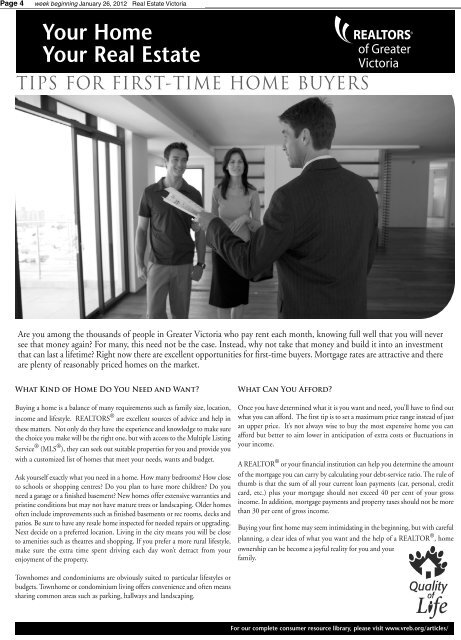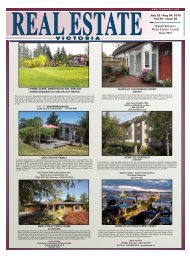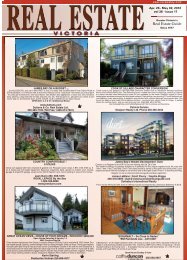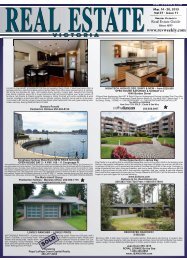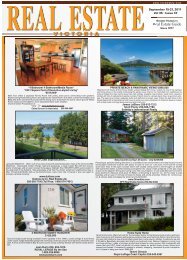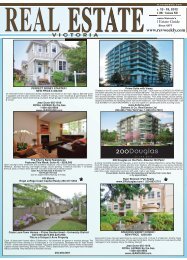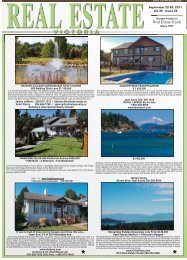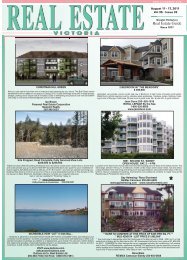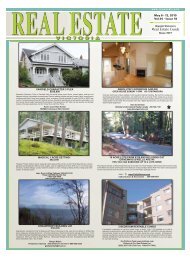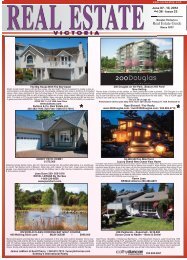Page 4 week beginning January 26, 2012 <strong>Real</strong> <strong>Estate</strong> <strong>Victoria</strong> Your Home Your <strong>Real</strong> <strong>Estate</strong> TIPS FOR FIRST-TIME HOME BUYERS Are you among the thousands of people in Greater <strong>Victoria</strong> who pay rent each month, knowing full well that you will never see that money again? For many, this need not be the case. Instead, why not take that money and build it into an investment that can last a lifetime? Right now there are excellent opportunities for first-time buyers. Mortgage rates are attractive and there are plenty of reasonably priced homes on the market. What Kind of Home Do You Need and Want? Buying a home is a balance of many requirements such as family size, location, income and lifestyle. REALTORS ® are excellent sources of advice and help in these matters. Not only do they have the experience and knowledge to make sure the choice you make will be the right one, but with access to the Multiple Listing Service ® (MLS ® ), they can seek out suitable properties for you and provide you with a customized list of homes that meet your needs, wants and budget. Ask yourself exactly what you need in a home. How many bedrooms? How close to schools or shopping centres? Do you plan to have more children? Do you need a garage or a finished basement? New homes offer extensive warranties and pristine conditions but may not have mature trees or landscaping. Older homes often include improvements such as finished basements or rec rooms, decks and patios. Be sure to have any resale home inspected for needed repairs or upgrading. Next decide on a preferred location. Living in the city means you will be close to amenities such as theatres and shopping. If you prefer a more rural lifestyle, make sure the extra time spent driving each day won’t detract from your enjoyment of the property. What Can You Afford? Once you have determined what it is you want and need, you’ll have to find out what you can afford. The first tip is to set a maximum price range instead of just an upper price. It’s not always wise to buy the most expensive home you can afford but better to aim lower in anticipation of extra costs or fluctuations in your income. A REALTOR ® or your financial institution can help you determine the amount of the mortgage you can carry by calculating your debt-service ratio. The rule of thumb is that the sum of all your current loan payments (car, personal, credit card, etc.) plus your mortgage should not exceed 40 per cent of your gross income. In addition, mortgage payments and property taxes should not be more than 30 per cent of gross income. Buying your first home may seem intimidating in the beginning, but with careful planning, a clear idea of what you want and the help of a REALTOR ® , home ownership can be become a joyful reality for you and your family. Townhomes and condominiums are obviously suited to particular lifestyles or budgets. Townhome or condominium living offers convenience and often means sharing common areas such as parking, hallways and landscaping. For our complete consumer resource library, please visit www.vreb.org/articles/
CONDOS, TOWNHOUSES, STRATA TITLES & DUPLEXES <strong>Real</strong> <strong>Estate</strong> <strong>Victoria</strong> week beginning January 26, 2012 Page 5 VICTORIA This publication lists properties for sale under the following categories: CONDOS, TOWNHOUSES, STRATA TITLES, DUPLEXES . . . . . . . . . . . . 5 VICTORIA . . . . . . . . . . . . 11 OAK BAY. . . . . . . . . . . . . .13 VIEW ROYAL . . . . . . . . . 13 ESQUIMALT . . . . . . . . . . 14 SAANICH EAST . . . . . . . 14 SAANICH WEST. . . . . . . 18 SAANICH PENINSULA .18 HIGHLANDS . . . . . . . . . .20 WEST SHORE . . . . . . . . .20 SOOKE . . . . . . . . . . . . . . .22 LOTS & ACRES. . . . . . . .23 WATERFRONT. . . . . . . . .23 GULF ISLANDS. . . . . . . . - MALAHAT . . . . . . . . . . . .26 UP ISLAND . . . . . . . . . . .26 INVESTMENT, COMMERCIAL & INDUSTRIAL . . . . . . . 27 AGENCY . . . . . . . . . . . . .27 OPEN HOUSE SUMMARY. . . . . . . . . 28, 29 <strong>Real</strong> <strong>Estate</strong> <strong>Victoria</strong> 818 Broughton Street <strong>Victoria</strong>, B.C. V8W 1E4 (250) 382-9171 rev@revweekly.com Visit our website at: www.revweekly.com FAX: 250-382-9172 GROUP PUBLISHER Penny Sakamoto SUPERVISOR Val Mackie PRODUCTION Rose Fasick, Elaine Gammon, Christine Hall, Annie Kelly, Brenda Kuebler, Jillian Trecartin NETWORK ADMINISTRATOR Jim Hamilton <strong>Real</strong> <strong>Estate</strong> <strong>Victoria</strong> is published weekly by Black Press Ltd. President: Mark Warner Founded in 1977, <strong>Real</strong> <strong>Estate</strong> <strong>Victoria</strong> follows the codes set down by the Canadian <strong>Real</strong> <strong>Estate</strong> Association and carries as a service to the community Multiple Listing Service® properties available in the Greater <strong>Victoria</strong> area. For subscription information and any queries or complaints regarding circulation please call 250-382-9171. All contents © 2000. The publisher will not be liable for any error in any advertisements published unless proof of such advertisement is submitted to the Advertiser and returned with such error or correction plainly noted in writing thereon, and in that case, if any error so noted is not corrected by the Publisher its liability shall not exceed the charge for the space actually occupied by the item in which the error is made. The Publisher shall not be liable for non-insertion of any advertisement beyond the paid for such advertisement. All claims of error in publication shall be made within thirty-six hours thereafter and if not so made shall not be considered. No claim will be allowed for more than one incorrect insertion, nor for errors not affecting the value of the advertisement. EXCELLENT INVESTMENT AT THE OSWEGO HOTEL 209-500 OSWEGO New MLS 303277 $399,000 A whole ownership 2 bed/2 bath, recreational condo in <strong>Victoria</strong>’s stylish Oswego Hotel. This is a fully furnished, sophisticated suite with comfortable living areas granite counter tops, slate floors, internet connection, media system, gourmet kitchen, balcony, beautiful bathrooms, offering all amenities and services expected from a hotel including a fitness centre, board room, restaurant, patio and a lounge. Located in the heart of quaint James Bay within walking distance of inner harbour, the Legislature and historic downtown for fabulous restaurants, entertainment and shopping, it’s an excellent investment generating year round revenue. Visit www.luxurybchomes.com spiercy@sothebysrealty.ca James LeBlanc Scott Piercy 250-812-7212 Sothebyís International <strong>Real</strong>ty Canada 250-686-7789 EXCEPTIONAL VALUE VERY LARGE 2 BED 2 BATH New MLS 303105 $289,000 Engineering report completed. Features extra large patio, big kitchen, gas FP, in unit laundry, storage room, secure parking & guest suite. On quiet side of building. Pets welcome! Sharon Schaalje “Scully” Sutton Group West Coast <strong>Real</strong>ty 250-479-3333 OCEAN VIEWS New ML 303347 $349,900 Imagine your 2 BR, 2 bath south facing corner suite condo with superb ocean views nestled in very quiet location only steps to the sea walk on Dallas Rd. Almost 1300 sq ft spacious rooms, inline living, dining and sunroom area all with great ocean views, modern kitchen, and master with 4 piece ensuite. The suite has been meticulously maintained, nothing to do but move in, in suite laundry, plenty of storage, covered parking, sorry no pets, rare find indeed, excellent buy, so call now Darren Day RE/MAX Camosun 250 478-9600 OPEN HOUSE FRI-SUN 1-3 119-2733 PEATT RD (NET HST AND 6 APPLIANCES ARE INCLUDED IN PRICE) 4 BED/3 BATH TOWNHOMES THE AVANTI New MLS 301624 $369,900 100% MORTGAGE FINANCING AVAILABLE OAC!! Award winning development crew created these contemporary, spacious townhomes. Modern functional design w/4 bed/3 baths in each. 6 appliances, custom Wenge & Quartercut Oak cabinetry, quartz stone countertops, 9ft vaulted ceilings, laminate floors, concrete siding & 10 year warranty. Live where you can walk to the grocery store & coffee shop. Walk, bike or hop on public transit to work. Downsize to one vehicle (or not!-parking for 2 in each unit). Participate in your community have time to enjoy your family. Prices range from mid $300K to just under $400K. www.karenlove.com www.avantitownhomes.com or on Facebook and Twitter: Search Karen Love <strong>Real</strong> <strong>Estate</strong> Karen Love Bon Hollier RE/MAX Alliance 250-386-8875 ~ OPEN HOUSE SAT. 1:30-3:30 #203-670 DALLAS ROAD OUTSTANDING 1971 STEEL & CONCRETE BLDG. ON WORLD-FAMOUS DALLAS RD. WATERFRONT NEAR MILE 0 New MLS 303353 $669,000 This 1673 sq.ft. S.E. corner is one of the largest in the building offering 3 bedrooms (or 2 with den), 2 full baths, laundry room, FP and unobstructed ocean views to the Olympic Mtns. A wonderfully peaceful location with ever-changing vistas & just steps to Beacon Hill Park or stroll downtown. Small pet welcomed! Betty ‘K’ 250-516-8306 Sutton Group West Coast <strong>Real</strong>ty 250-479-3333 ~ OPEN HOUSE SUN 2-4 402-1055 HILLSIDE LOVELY TOP FLOOR CONDO IN POPULAR QUADRA VILLAGE New MLS 302798 $237,000 Bright top floor unit on the quiet side of the building. South facing spacious balcony, vaulted ceiling, floor to ceiling windows, skylight, open concept kitchen. Cozy gas fireplace, insuite laundry, secure underground parking, guest suite, fully remediated building. Small pets are welcome and some rentals are allowed. Great location just steps from restaurants, cafes, theatre and shopping! Mette Pedersen RE/MAX Camosun 250-744-3301 ~ 1 BDRM + DEN IN-SUITE LAUNDRY PETS ALLOWED New MLS 302885 $209,900 This modern one bedroom + den suite comes w/in-suite laundry, secure underground parking, in a remediated building walking distance to Mall, Theater, parks, Gorge Waterway, restaurants & buses. 1 cat & 1 small dog allowed. No age restrictions. Some rentals allowed. www.couvelier.com Rick Couvelier DFH <strong>Real</strong> <strong>Estate</strong> Ltd. 250-477-7291 “WELCOME TO ERSKINE LANE” New MLS 303336 $449,500 Beautifully appointed in move-in condition. This 4 bdrm, 4 bath corner unit has been nicely updated - bathroom fixtures with vessel sinks, current colour scheme, countertops, cork flooring, tile floors, and 2011 custom design patio with interlocking bricks & flower gardens - perfect for summer BBQ’s & entertaining. You will love the location backing onto green space & bordering the Galloping Goose. You will appreciate the double garage with ample parking in the driveway. Convenient level entry access to the main floor from the laneway behind. Enjoy neighbourly community. ML 303336 Offered at $449,500.00 Sharen Warde & Larry Sims Royal LePage Coast Capital <strong>Real</strong>ty 250-592-4422 CHELSEA GREEN SWAN LAKE New MLS 303356 $293,900 Properly priced, bright 2 bedroom, 2 bathroom condo situated on quiet side of Chelsea Green. Spacious open & flexible floor plan with sensible updates including new paint, carpet and linoleum in tasteful colours, cosy gas fireplace in living room recently upgraded with thermostat. Newer washer, dryer and hot water tank in separate laundry room. Good kitchen with separate eating space or dining area, master with plenty of closet space and full ensuite. Mountain glimpses from 2 large & private balconies. Secure underground parking and separate storage. Families, rentals and pets welcome. Exceptional location, close to Uptown Mall and all shopping, library, all major bus routes, Swan Lake and Goose Trail. Jeff Shorter 250-744-9903 Pemberton Holmes Cloverdale 250-384-8124 JAMES BAY New MLS 303292 $224,900 Updated 1 bdrm condo tucked away on a quiet street in the heart of James Bay. Fully remodelled kitchen, updated bath, laminate flooring, paint & trim. 1 parking stall. Storage locker & insuite storage. $224,900 Stacey English Royal LePage Coast Capital <strong>Real</strong>ty 250-477-5353 LIVE RIGHT ON THE GOLF COURSE New ML 303199 $399,900 Outstanding south facing 3rd floor condo in the prestigious Ironwood Complex. This suite offers: 1,100 sq.ft. of living space, 2 spacious bedrooms, 2 bathrooms (5 piece, 4 piece), upgraded appliances, living room with electric fireplace, open kitchen, spacious balcony, secured parking all in a great location. 303E-1115 Craigflower. $399,900. Mike McCulloch Royal LePage Coast Capital-Downtown 250-384-7663 BRIGHT QUIET UPPER FLOOR You’ll love this third floor bright open floor plan. In suite laundry, private balcony, storage, secure underground parking and a fantastic common area second to none for the 55+ crowd. ML 302287 www.dfsuperhomes.com Chris Dusseault Brad Forrest Royal LePage Coast Capital <strong>Real</strong>ty Westshore 250-474-4800 OPEN HOUSE SAT 2-4PM #23-901 KENTWOOD $459,000 3 BD 3 BA 1535 sq. ft. townhouse on crawl space in the 45+ Falcon Ridge <strong>Estate</strong>s in Broadmead. Large single car garage with courtyard entry. Great layout with main level living all on one floor plus upper floor with 3rd bdrm and bath perfect for guests. Complex also offers clubhouse, pool, sauna & billiards rm and allows 2 small pets. Great location as well, with a short stroll to Broadmead Village, public transportation, Commonwealth Aquatic center and public library. Elk and Beaver lakes nearby & walking trails at Rithets sanctuary. Motivated Seller. MLS# 299290 Website: www.SaveThousandsNow.ca Lilian & James Andersen One Percent <strong>Real</strong>ty Vancouver Island 250-213-3710 ~ SUNSHINEY SWEETHEART 4<strong>04</strong>-898 VERNON AVE $244,900 This top floor one bedroom plus den unit is south-facing and flooded with glorious sunlight. Nice layout, gas FP, brand new carpets, in-suite laundry, UG parking. terrific Chelsea Green condo near Uptown Mall. Proudly offered @ $244,900. MLS 303164 Laurie Abram Newport <strong>Real</strong>ty 250-385-2033 EXCELLENT QUALITY + WORKMANSHIP This 2 BR condo is beautifully decorated and updated throughout. Southerly views over a park and towards downtown. Quality features include a custom designed kitchen, deluxe s/s appliances, heated floors in both the kitchen and updated bath, sunken living room with feature fireplace, built-in HD televisions, custom window blinds, recessed lighting, several custom built-in cabinetry and more. A fabulous apartment in a convenient location near town. MLS 301978 $274,000. Ed G. Sing RE/MAX Camosun 250-744-3301 DOWNTOWN WITH VIEWS $194,900 Walk to town, shopping and restaurants! This nicely situated 1 BR & bath home has a southerly exposure, open living/ dining, galley kitchen, updated bath and large master BR. Terrace to enjoy year round, rooftop deck & lounge, amenities in building including spa! This home is ready to move in! Don’t miss out! MLS 30274 Noah Dobson 250-385-2033 Newport <strong>Real</strong>ty noahdobson.com 5315833 $488,000 “Best-kept Secret” Open Sat 1-4 43-901 Kentwood Lane Excellent Bright Southfacing 3B, 3BA townhouse in “Falcon Ridge <strong>Estate</strong>s”. Heated Tile floors in master ensuite & kitchen. In mint condition & ready to move in. Appr 7 acres of Quiet and peaceful Living in the Heart of Broadmead. BONUS, RV, Boat, Trailer parking, Clubhouse with heated indoor swimming pool. ML 301467 Michael Luyt 250-216-7547 Pemberton Holmes Cloverdale 250 384-8124 5316116


